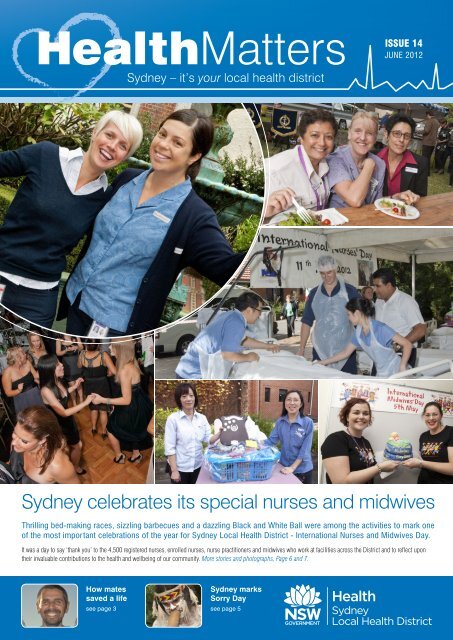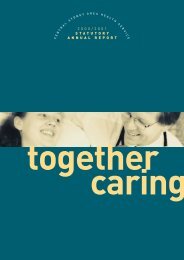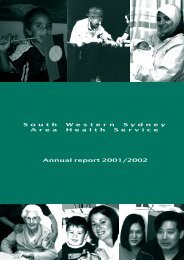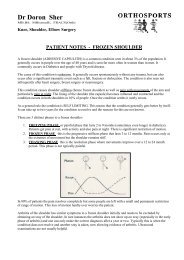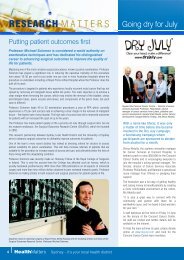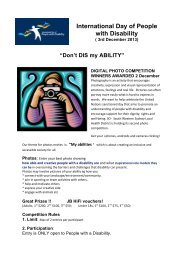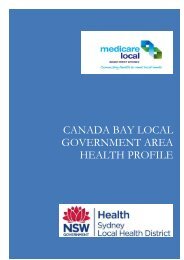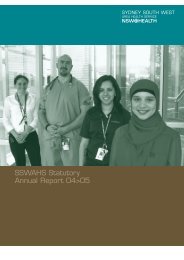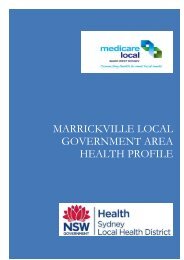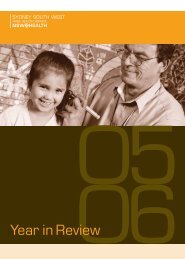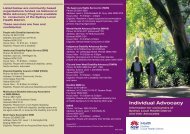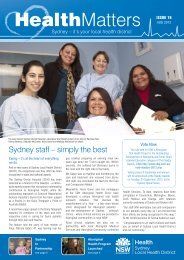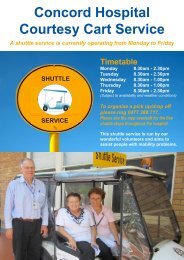June 2012 - Sydney Local Health District
June 2012 - Sydney Local Health District
June 2012 - Sydney Local Health District
Create successful ePaper yourself
Turn your PDF publications into a flip-book with our unique Google optimized e-Paper software.
<strong>Health</strong>Matters<br />
<strong>Sydney</strong> – it’s your local health district<br />
Issue 14<br />
JUNE <strong>2012</strong><br />
<strong>Sydney</strong> celebrates its special nurses and midwives<br />
Thrilling bed-making races, sizzling barbecues and a dazzling Black and White Ball were among the activities to mark one<br />
of the most important celebrations of the year for <strong>Sydney</strong> <strong>Local</strong> <strong>Health</strong> <strong>District</strong> - International Nurses and Midwives Day.<br />
It was a day to say ‘thank you’ to the 4,500 registered nurses, enrolled nurses, nurse practitioners and midwives who work at facilities across the <strong>District</strong> and to reflect upon<br />
their invaluable contributions to the health and wellbeing of our community. More stories and photographs, Page 6 and 7.<br />
How mates<br />
saved a life<br />
see page 3<br />
<strong>Sydney</strong> marks<br />
Sorry Day<br />
see page 5
Message from the Chief Executive<br />
<strong>Sydney</strong> <strong>Local</strong> <strong>Health</strong> <strong>District</strong> is finalising plans ahead of the<br />
implementation of Activity Based Funding (ABF) on the first of July.<br />
The <strong>District</strong> has engaged KPMG to assist with the budgeting process<br />
to ensure it is ready for the new challenges the new funding model<br />
brings. A symposium was held at Redfern in May for senior executive<br />
from around the state to discuss the implementation of ABF and provide<br />
valuable insight to the changes <strong>Local</strong> <strong>Health</strong> <strong>District</strong>s can expect.<br />
Dr Teresa Anderson<br />
<strong>Sydney</strong> <strong>Local</strong> <strong>Health</strong> <strong>District</strong><br />
Chief Executive<br />
Progress on the Lifehouse project continues on the<br />
RPA campus this month. Ambulatory care services will<br />
begin operating from Lifehouse mid 2013. Information<br />
sessions are currently being held for staff ahead of the<br />
transition of services. If staff have any questions, they<br />
can contact the <strong>District</strong> HR department.<br />
In SLHD we value our partnerships with our community<br />
and I am very pleased to announce the appointment<br />
of our new <strong>District</strong>-wide Community Participation<br />
Manager, Tarika Rivers. In her role, Ms Rivers will work<br />
with each Hospital’s Community Participation Officer<br />
to ensure there is effective two-way communication<br />
and participation between our health services and the<br />
communities we serve.<br />
The <strong>District</strong> is also looking forward to the launch of<br />
our first Community Participation Framework over the<br />
coming months.<br />
I am delighted to announce the appointment of Paula<br />
Caffrey as SLHD Allied <strong>Health</strong> Director, Graeme Angus<br />
as Manager of Corporate and Shared Services and<br />
Julie Finch as SLHD Chronic Care Program Manager.<br />
I am sure you will join me in welcoming them to their<br />
new roles.<br />
The <strong>District</strong> reaffirmed its commitment to Aboriginal<br />
health equity last month when it commemorated<br />
National Sorry Day at Concord General Repatriation<br />
Hospital. The event followed the <strong>District</strong>’s highly<br />
successful Close the Gap event at RPA in March.<br />
Through our services, we are committed to doing what<br />
we can to help the spiritual, emotional and physical<br />
wellbeing of our Aboriginal and Torres Strait Islander<br />
community.<br />
I’d also like thank staff for their participation in<br />
International Nurses Day events across the <strong>District</strong>. The<br />
pictures in this month’s photo gallery highlight some<br />
of the wonderful celebrations held in all of our facilities<br />
and services.<br />
Message from the Chair, <strong>District</strong> Board<br />
The Hon. Ron Phillips<br />
<strong>Sydney</strong> <strong>Local</strong> <strong>Health</strong> <strong>District</strong><br />
Board Chairman<br />
As part of its Strategic Planning process, <strong>Sydney</strong> recently<br />
conducted a consultation forum to help shape the future of<br />
education and training across the <strong>Local</strong> <strong>Health</strong> <strong>District</strong>.<br />
Executive staff and leaders in education and training across the <strong>District</strong> attended the session, facilitated<br />
by Dr Norman Swan, with a keynote address by Heather Gray, Chief Executive of the new <strong>Health</strong><br />
Education Training Institute.<br />
In her address, Ms Gray recognised the <strong>District</strong>’s long-standing strength in education and training. She<br />
also spoke about the positive partnership already made with SLHD and the role of HETI in providing a<br />
state-wide approach to education and training.<br />
<strong>Sydney</strong> needs to ensure we have a highly skilled, adaptable, culturally sensitive workforce ready to take<br />
on the challenges we face in healthcare now and those we know are coming in the future. Education is<br />
also an integral part of ensuring we remain a recognised leader in health service delivery.<br />
I look forward to seeing the results of the consultation in delivering on a plan with realistic goals to<br />
ensure <strong>Sydney</strong> remains at the forefront of healthcare training delivery in NSW.<br />
I would like to encourage interested staff and members of the public to visit the SLHD website (www.<br />
slhd.nsw.gov.au). Visitors will find a range of videos of recent <strong>District</strong> events, publications, Board<br />
minutes and more.<br />
2 <strong>Health</strong>Matters <strong>Sydney</strong> – it’s your local health district
Playing for keeps:<br />
how mates saved a life<br />
NOMINATE OUTSTANDING STAFF<br />
In <strong>Sydney</strong> <strong>Local</strong> <strong>Health</strong> <strong>District</strong>, our staff work hard to<br />
make a difference to our community every day.<br />
If you think a member of our staff has given you exceptional service in any way<br />
we’d like to hear from you, so we can acknowledge their efforts.<br />
Please fill out the short form on the back of this card and drop it in one of our<br />
Have Your Say boxes located around our Hospitals and Services.<br />
Or you could fill out this card on our website www.slhd.nsw.gov.au<br />
Thanking you,<br />
<strong>Sydney</strong>... it’s your local<br />
health<br />
district<br />
A second chance: John Jacovides (centre), thanks paramedics Gavin Wood and Matthew Gourlay for saving his life.<br />
As a cardiac arrest survivor, the<br />
latest addition to the trophy cabinet<br />
at John Jacovides’ home puts him<br />
in an elite club, but he knows the<br />
real glory belongs to those who<br />
saved his life.<br />
The 36-year-old father of two was suffering<br />
heartburn before his weekly game of Saturday<br />
afternoon soccer last month, but thought little<br />
of it.<br />
Within minutes, he had collapsed on the field,<br />
unresponsive to teammates.<br />
Quick-thinking friends rang Triple Zero while<br />
a player on the opposing team started cardiopulmonary<br />
resuscitation. Fellow players ran to<br />
the nearby swimming pool for help, bringing<br />
back lifeguards and a defibrillator.<br />
One shock and Mr Jacovides’ heart was beating<br />
again. But he is one of the lucky few.<br />
Survival rates for people suffering cardiac arrest<br />
outside of a hospital are as low as 3 per cent,<br />
mainly because most people do not have access<br />
to defibrillators, and few receive treatment in the<br />
first few minutes after an arrest, said the cardiac<br />
project officer with the Ambulance Service of<br />
NSW, Bernard Coren.<br />
“Common precursors to absence of pulse and<br />
subsequent death are two ineffective heart<br />
rhythms called ventricular fibrillation and<br />
ventricular tachycardia,” Mr Coren said.<br />
“Early application of an automated external<br />
defibrillator can shock these lethal rhythms<br />
back into an effective heart beat through<br />
electrical therapy. CPR should be given before<br />
defibrillation if possible.<br />
“Early CPR and defibrillation can minimise<br />
damage to the brain by restoring the pumping<br />
action of the heart. AEDs have saved many lives.<br />
They are simple to use and are an essential item<br />
in the modern workplace.”<br />
He said most paramedics had stories of patients<br />
who waited too late for treatment.<br />
“I can’t stress enough how important it is to pick<br />
up the phone and call triple zero straight away<br />
for people who experience the warning signs of<br />
a heart attack or cardiac arrest.”<br />
After more than a week in RPA, Mr Jacovides<br />
was given the chance, as part of <strong>Health</strong>y Heart<br />
Week, to thank paramedics, Matthew Gourlay<br />
and Gavin Wood, for saving his life. They also<br />
presented him with a cardiac arrest survivors’<br />
award.<br />
“I'm alive today and can continue to be a father<br />
and husband because of the hard work of these<br />
paramedics. I will never be able to thank them<br />
enough,” Mr Jacovides said.<br />
Heart attack warning signs may include pain,<br />
pressure, heaviness or tightness in one or<br />
more parts of the upper body (chest, neck, jaw,<br />
arm(s), shoulder(s) or back) in combination<br />
with other symptoms of nausea, shortness of<br />
breath, dizziness or a cold sweat.<br />
Say ‘thank you’ to outstanding staff<br />
Staff and members of the community are reminded<br />
that they can acknowledge those staff members they<br />
feel have offered exceptional care and service through<br />
the <strong>Sydney</strong> <strong>Local</strong> <strong>Health</strong> <strong>District</strong> Staff Recognition<br />
Program<br />
The program, launched in March, aims to recognise<br />
hard work, commitment and outstanding care of<br />
patients.<br />
‘Have your say’ boxes, flyers and nomination forms<br />
can be found in each hospital and at the <strong>District</strong><br />
office. Nominations can also be made on line: http://<br />
www.slhd.nsw.gov.au/feedback.html<br />
Help for carers of people with dementia<br />
Do you live with or care for someone with dementia?<br />
Concord Repatriation General Hospital will host a<br />
series of free information sessions to give people<br />
a chance to ask questions about everything from<br />
support services, legal issues and how to plan<br />
ahead.<br />
The dates are Thursday, 23 August and Monday,<br />
5 November.<br />
For more information or to register contact Anne Tunks<br />
on 9378 1258 or anne.tunks@sswahs.nsw.gov.au<br />
Partners in depression<br />
People who love or care for someone<br />
experiencing depression are invited to join a free<br />
program that aims to provide them with emotional<br />
support and the skills to help them cope.<br />
‘Partners in Depression’ is a successful six-week<br />
program that provides a safe and relaxed forum<br />
for carers to ask questions and access support<br />
resources.<br />
SLHD Clinical Nurse Consultant, Felicity Meehan,<br />
said people caring for someone experiencing<br />
depression often found relief in sharing their<br />
struggles with someone they could trust.<br />
Sessions will be held on Thursdays 10am–<br />
12:30pm, <strong>June</strong> 14, through to July 19, at Redfern<br />
Community <strong>Health</strong> Centre. Call Felicity Meehan<br />
on 9378 1224 to register your interest or for<br />
more information.<br />
<strong>Health</strong>Matters<br />
3
Research M a t t e r s<br />
Unlocking the secrets of statins<br />
Researchers from the Heart Research Institute (HRI) believe they<br />
may have discovered why increasing the dosage of statins doesn’t<br />
necessarily result in a corresponding reduction in bad cholesterol.<br />
Australians are the highest users of cholesterol-lowering drugs in the world, with around two<br />
million people thought to be taking some form of statin.<br />
Statins reduce bad cholesterol (also known as LDL) by as much as 50 per cent and the risk of<br />
cardiovascular disease (CVD) by up to 30 per cent. The lower a person’s LDL, the less likely<br />
they are to have a heart attack.<br />
Professor Kerry-Anne Rye from the Lipid Group at HRI said it had been a biological puzzle<br />
as to why increasing the dose of statins beyond a certain level did not necessarily result in a<br />
corresponding additional reduction in LDL.<br />
“We know that statins work by blocking a critical step of the cholesterol synthesis pathway<br />
inside the cell, which in turn activates a feedback mechanism resulting in cells removing LDL<br />
from the blood. The overall result is a reduction in levels of circulating LDL,” Prof Rye said.<br />
“So what is stopping higher doses of statins reducing cholesterol levels even further? This can<br />
be partially explained because statins also activate a protein (known as PCSK9) that blocks<br />
cells from absorbing cholesterol from the blood.<br />
“We already know that increasing the dose of statins does not result in a corresponding drop<br />
in LDL cholesterol, so we predicted that PCSK9 might also be going up.”<br />
Prof Rye’s team measured the levels of PCSK9 in 1613 patients who were taking part in the<br />
Treating to New Targets (TNT) study, a trial developed to compare the effectiveness of low<br />
versus high doses of atorvastatin, known commercially as Lipitor, on cholesterol levels.<br />
“To our surprise, PCSK9 did not change from low doses of statins (10 mg) to high doses (80<br />
mg), suggesting that the levels of PCSK9 present in patients taking 10 mg statin are already<br />
maximally high”, Prof Rye said.<br />
“So even when we increase the dose of statins 8-fold, PCSK9 will prevent them from working<br />
optimally. This indicates to us that PCSK9 might be an extremely promising target for<br />
therapeutic intervention.<br />
“Our findings pave the way for the use of PCSK9 inhibitors in addition to statins to reduce the<br />
risk of heart disease which is an increasingly large problem.”<br />
In a paper recently published in the prestigious Journal of the American College of Cardiology, Prof<br />
Rye’s team looked at what happens to PCSK9 when patients receive increased doses of statins.<br />
<strong>Sydney</strong> <strong>Local</strong> <strong>Health</strong> <strong>District</strong>, together<br />
with Lifehouse, have met with RPA<br />
Heads of Department and staff affected<br />
by the Lifehouse development to<br />
present the Models of Care.<br />
It follows months of work by all<br />
departments of RPA to ensure the<br />
transition of services to Lifehouse will<br />
be as smooth as possible for staff and<br />
patients, and that there will be effective<br />
working models in place to provide the<br />
highest standard of cancer care to our<br />
community.<br />
Meetings are also being held with staff<br />
and unions to discuss Lifehouse’s<br />
Employee Principles for the project. At<br />
these meetings, staff will be able to ask<br />
questions of the <strong>District</strong> and Lifehouse<br />
about how the changes will affect them.<br />
This month LIfehouse construction<br />
teams poured the concrete for floors<br />
above-ground level, following last<br />
month’s milestone of work reaching<br />
ground level.<br />
To celebrate, Brookfield Multiplex<br />
hosted a cocktail party on site last<br />
month, where employees of Lifehouse,<br />
<strong>Sydney</strong> Cancer Centre, Radiation<br />
Oncology, RPA and <strong>Sydney</strong> <strong>Local</strong> <strong>Health</strong><br />
<strong>District</strong> and other key representatives<br />
were given a tour of the construction<br />
progress.<br />
Professor Kerry-Anne Rye, group leader of The Lipid Research Group, works with PhD student Francine Petrides.<br />
4 <strong>Health</strong>Matters <strong>Sydney</strong> – it’s your local health district
<strong>Sydney</strong> commemorates Sorry Day<br />
Matthew Swanborough, General Manager Concord Repatriation General Hospital, joins students from Concord West Public School at the <strong>District</strong>’s Sorry Day ceremony.<br />
School children from Concord West<br />
Public School quietly ‘planted’<br />
dozens of coloured plastic feet<br />
around Concord Repatriation General<br />
Hospital’s flag pole last month as part<br />
of SLHD’s National Sorry Day event.<br />
The 54 feet, in the colours of the Aboriginal and<br />
Torres Strait Islander flags, represented the 54<br />
recommendations of the 1998 Bringing Them<br />
Home Report, which revealed the true extent of<br />
the trauma caused by past removal policies on<br />
Aboriginal people.<br />
SLHD Director Aboriginal <strong>Health</strong>, George Long,<br />
said the report showed how the policies had left<br />
Aboriginal people spiritually, emotionally and<br />
physically traumatised by the broken connection<br />
to traditional land, culture and language and the<br />
separation of families.<br />
“SLHD acknowledges how these factors have<br />
contributed to poor health and risk taking<br />
behaviours such as substance abuse within<br />
the Aboriginal community and to the 10-17<br />
year health gap between Indigenous and non-<br />
Indigenous Australians,” Mr Long said.<br />
“We acknowledge that members of the Stolen<br />
Generation and of the Aboriginal community in<br />
general have greater health challenges and needs<br />
than non-Indigenous Australians.<br />
“We are committed to delivering accessible,<br />
culturally appropriate, holistic health services<br />
to the local Aboriginal and Torres Strait Islander<br />
community, one of the largest urban Aboriginal<br />
populations in NSW, and to doing what we can<br />
to help heal the spiritual, emotional and physical<br />
wounds of the past, and the present,” he said.<br />
The event also featured guest speakers, Aboriginal<br />
cultural performances and displays.<br />
Mentoring honours for SLHD doctor<br />
Balmain and RPA Hospital geriatrician Dr Scott Murray has been honoured by the<br />
Royal Australasian College of Physicians for his work mentoring young clinicians.<br />
The Excellence in Mentoring Award was presented at the Royal Australasian College of Physicians congress<br />
in May. Dr Murray has pioneered training and mentoring programs at Balmain Hospital for 15 years, as<br />
Director of Prevocational Education and Training and Director of Physician Training.<br />
“This award reflects highly on the successful education programs running across <strong>Sydney</strong> <strong>Local</strong> <strong>Health</strong><br />
<strong>District</strong>,” Dr Murray said.<br />
Balmain Hospital General Manager, Tim Sinclair, said Dr Murray was an excellent role model for junior staff.<br />
“He has shown an exceptional and sustained commitment to the education and support of young doctors<br />
from their student and intern years through to completion of physician training and beyond,” Mr Sinclair said.<br />
Dr Scott Murray, Balmain Hospital Director<br />
of Prevocational Education and Training and<br />
Director of Physician Training<br />
<strong>Health</strong>Matters<br />
5
<strong>Sydney</strong> celebrates its nurses and midwives<br />
Thrilling bed-making races, sizzling<br />
barbecues and a dazzling Black<br />
and White Ball were among the<br />
activities to mark one of the most<br />
important celebrations of the year for<br />
<strong>Sydney</strong> <strong>Local</strong> <strong>Health</strong> <strong>District</strong> mark -<br />
International Nurses and Midwives Day.<br />
SLHD Director of Nursing and Midwifery,<br />
Katharine Szitniak, said all the events held<br />
across the <strong>District</strong> on May 11 were a chance to<br />
shine the spotlight on the largest of all health<br />
professions and to say ‘thank you’.<br />
“Our nursing staff work hard every day to make a<br />
difference to the lives of their patients and their<br />
families, and to our community,” Ms Szitniak said.<br />
“International Nurses and Midwives Day is a<br />
day when we can publicly acknowledge their<br />
outstanding commitment and dedication and to<br />
reflect on how vital they are to our health system.”<br />
This year, for the first time, one nurse from each<br />
of the <strong>District</strong>’s hospitals and services was<br />
recognised by the SLHD Executive for Excellence<br />
in Person Centred Care.<br />
The winners are: Violetta Buesing (Balmain<br />
Hospital), Ya Ying (Liz) Yang (The Canterbury<br />
Hospital), Denise Cummins (Community<br />
<strong>Health</strong>), Margaret Molloy (Concord Repatriation<br />
General Hospital), Lesly Jones (Mental <strong>Health</strong>)<br />
and Mary Lordan (RPA).<br />
To view the SLHD International Nurses and<br />
Midwives Day video go to http://www.slhd.nsw.<br />
gov.au/videos.html?v=3<br />
For more photos from International Nurses and<br />
Midwives Day go to http://www.slhd.nsw.gov.au/<br />
media_photo.html<br />
Balmain Hospital Acting Director of Nursing Jacqueline Morgan (centre) and SLHD Director of Operations Gary Miller<br />
congratulate SLHD Award for Excellence winner Violetta Buesing.<br />
SLHD Director of Nursing and Midwifery Katharine Szitniak (right) with SLHD Award for Excellence winner Mary Lordan.<br />
Jon Lock and Kat Hay won the Best Dressed at RPA’s<br />
Black and White Ball.<br />
SLHD Director of Medical Services Claire Blizard (right) congratulates SLHD Award for Excellence winner Ya Ying Yang.<br />
6 <strong>Health</strong>Matters <strong>Sydney</strong> – it’s your local health district
Spotlight on community health nursing<br />
Known affectionately by some clients<br />
as ‘the doc’, Community <strong>Health</strong><br />
Nurse Practitioner, Tony Hecimovic,<br />
is a welcome and familiar face at The<br />
Exodus Foundation in Ashfield.<br />
Mr Hecimovic has been running a health and<br />
wellbeing clinic at the welfare centre twice a<br />
week for the past three years.<br />
“It’s about bringing healthcare directly to<br />
disadvantaged or marginalised people who<br />
wouldn’t normally go to a GP or hospital”, Mr<br />
Hecimovic said.<br />
“I’m humbled to be a part of the team serving at<br />
The Exodus Foundation.<br />
“I’ve been in community nursing for 10 years<br />
and this is one of the most rewarding parts of my<br />
job,” he said.<br />
The Exodus Foundation is a ministry of the Uniting<br />
Church in Ashfield, providing welfare, healthcare<br />
and education programs for disadvantaged and<br />
homeless people.<br />
To view Mr Hecimovic in the SLHD International<br />
Nurses Day video go to: http://www.slhd.nsw.<br />
gov.au/videos.html?v=3<br />
Community <strong>Health</strong> Nurse Practitioner Tony Hecimovic (right) with Exodus Foundation clients Mark McGovern and<br />
Robert ‘Fish’ Staff<br />
Midwives bake-off<br />
Sweet treats were at the centre of celebrations when RPA midwives held a bake-off to mark<br />
International Midwives Day in May.<br />
RPA Director of Nursing and Midwifery Joanne Edwards was among those tasked with<br />
deciding on the best tasting cakes.<br />
Natalie Parker was awarded Best Decorated Cake for her creation, which was topped with an<br />
icing replica of a mother and baby in a birthing pool.<br />
Leaders of the future<br />
RPA midwives celebrate during May<br />
Watch these faces – they are the first nurses and<br />
midwives from across the <strong>Sydney</strong> <strong>Local</strong> <strong>Health</strong><br />
<strong>District</strong> selected to train under the ‘Leaders of<br />
the Future Program’.<br />
The new 10-month scheme uses practical<br />
training and mentoring sessions to enhance<br />
the knowledge and skills of registered nurses<br />
and midwives who want to become clinical and<br />
managerial leaders.<br />
Participants have the opportunity to develop a<br />
well-rounded vision of management styles and<br />
practices.<br />
<strong>Health</strong>Matters<br />
7
Graduating in leadership<br />
New graduates Kiel Harvey, Leanne Hunter, Kristen Ireland and Michael Morris.<br />
With Australia’s health care system<br />
coming under increasing pressure<br />
from an ageing population, new<br />
technologies and funding constraints,<br />
<strong>Sydney</strong> <strong>Local</strong> <strong>Health</strong> <strong>District</strong> last<br />
month celebrated a new generation of<br />
leaders in health service delivery to<br />
help guide the way into the future.<br />
Kiel Harvey, Leanne Hunter, Kristen Ireland<br />
and Michael Morris formally graduate from the<br />
<strong>District</strong>’s 2011 Graduate <strong>Health</strong> Management<br />
Program at an event in RPA’s Kerry Packer<br />
Education Centre last month.<br />
The two-year program saw the group undertake a<br />
range of learning and management development<br />
courses, including a part-time enrolment in a<br />
Masters of Business Administration majoring<br />
in <strong>Health</strong> Management, to support their<br />
understanding of the health system and the<br />
development of their leadership skills.<br />
SLHD Chief Executive, Dr Teresa Anderson, said<br />
the value of the program was immeasurable.<br />
“They have the chance to not only gain an MBA<br />
qualification in <strong>Health</strong> Management, but also<br />
to have face to face, hands on training in the<br />
system,” she said.<br />
“We need to ensure we have a highly skilled,<br />
adaptable, culturally sensitive workforce ready to<br />
take on the challenges we face in healthcare now<br />
and those we know are coming in the future.”<br />
Graduate Kiel Harvey thanked the program’s<br />
supervisors for their ongoing support.<br />
“This program has given us the opportunity to<br />
develop our careers after learning from the best<br />
and most senior managers in the state,” he said.<br />
“We have seen our supervisors handle the<br />
toughest and most daunting of situations and<br />
have learnt to methodically approach them in a<br />
sensible manner.<br />
“We feel prepared to tackle the any challenge<br />
thrown out in the world of health service<br />
management.”<br />
We need to ensure we have a<br />
highly skilled, adaptable, culturally<br />
sensitive workforce ready to take<br />
on the challenges we face in the<br />
healthcare now and those we<br />
know are coming in the future,”<br />
Dr Teresa Anderson.<br />
A heartfelt donation to<br />
RPA cardiology ward<br />
On the wall of RPA Cardiology<br />
Ward 6E4 hangs an original<br />
Aboriginal painting depicting<br />
a stylised pod of dolphins<br />
happily immersed in a deep,<br />
calm blue sea.<br />
It was donated by the Coorey family, in<br />
gratitude for the care and love shown by<br />
cardiology staff towards their beloved<br />
mother, Tanam, who died late last year of<br />
chronic heart failure aged 89.<br />
Mrs Coorey required regular admission<br />
into the ward for treatment when<br />
she became ill, receiving ongoing<br />
monitoring by Professor Phillip Harris<br />
in his clinic. Specialist Chronic Cardiac<br />
nurses, Robyn MacDonald and Nicole<br />
Bennett, also visited Mrs Coorey in<br />
her own home, a service they provide<br />
to many patients with chronic cardiac<br />
conditions.<br />
“I can’t praise the doctors and the<br />
nursing staff highly enough,” May<br />
Coorey, the youngest of Mrs Coorey’s<br />
nine children, said.<br />
“They were there for us 24/7. Nothing<br />
was too much trouble. They helped us<br />
get another 19 months with our mum.<br />
Our family is so grateful,” she said.<br />
Mrs Coorey said her brother had first<br />
spotted the painting.<br />
“To all of us, it was just perfect,” she said.<br />
“The dolphins and the blue of the water<br />
are so peaceful. And the care and the<br />
treatment the staff here gave our mother<br />
was also beautiful.”<br />
Mrs Coorey snr is survived by nine<br />
children, 19 grandchildren, and 21 great<br />
grandchildren.<br />
(from left) Joan Jones, Prof Phil Harris, May Coorey,<br />
Therese Boukaram, George Coorey and Robyn<br />
MacDonald with the donated Aboriginal painting.<br />
Produced by: <strong>Sydney</strong> <strong>Local</strong> <strong>Health</strong> <strong>District</strong><br />
Design & Print by: Horizon Media<br />
Printed on Precision Offset PEFC Certified<br />
ISO 14001 Environmental Accreditation<br />
<strong>Health</strong>Matters is all about you. We would love to hear your<br />
stories. Simply email sydneymedia@sswahs.nsw.gov.au


